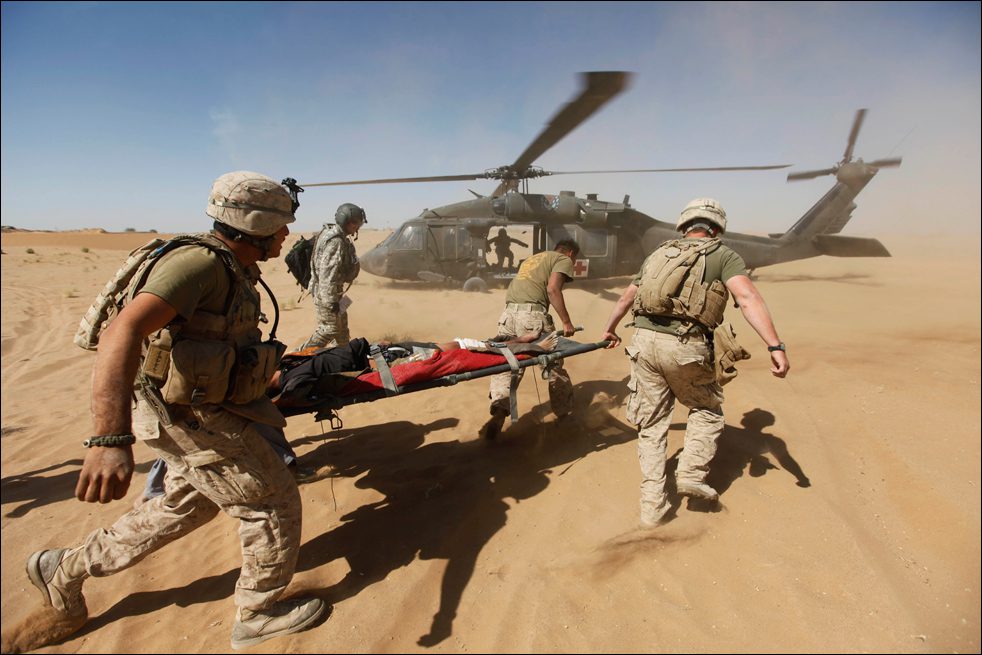Christopher J. Schayer
New Haven, Connecticut
His gloved hand grazed lightly the bulbous edges of my abdominal scars. My entire left flank, once lean and muscular, is now rippled with nodules of scar tissue and adhesions. I was not his average patient and as his fingers traversed the lumpy terrain of my abdomen, he began to realize that too.
It still causes me pain each time I lift my shirt and see the remnants of that day. Each bump, each crevice, with its own unique story and its own horrific consequences. The fog still engulfs my head while the ringing fills my ears and indescribable pain undulates through my body. The worst part is not the pain, or the disfigurement of my young and at one time athletic body, but the constant memory of what happened that day.
He finally looks up at me with a look of concern and confusion, a look I am all too familiar with. I simply utter two words: “IED. Afghanistan.” Then I gesture toward the tattoo on my right deltoid muscle of the US Army. It is odd really, to have both the cause and the effect juxtaposed on different sides of my body. Two images, one chosen, one not, tell the entire tumultuous story of my adult life.
Trying to avoid asking more about my time in Afghanistan, he begins asking about my medical history, as if my time on the battlefield and my time in the infusion chair are really all that different. There, adrenaline filled my veins as I avoided bullets. Here, potent immunosuppressants and steroids course through my body while I try to avoid infection. I play along with his questions because I know he is learning, and I describe my initial diagnosis of aplastic anemia in my teens. I explain how my treatment led to remission and until recently that aspect of my life had been fine. I had focused my attention on returning to my men and women in Afghanistan. Feeling each day I should be there, finishing what I started, knowing they need me. But as fate would have it, as if I had not endured enough in my not even 30-year-old life, I have relapsed and find myself back here in the hospital, a world away from where I should be.
He and his nurse practitioner “teacher” tell me that all of my blood components are at “dangerously low levels” and that I will need another stem cell transplant. While I feared this was inevitable, it hits me hard. It feels like another piece of shrapnel impaling my already damaged soul. I feel as though I am lying there again, amidst the dust and confusion of the explosion. Trying to make sense of what is happening. They begin to explain the treatment process, but I hear none of it. I remember everything going black that day and waking up in a hospital room in Germany after having two life saving surgeries. How I was torn from my comrades without any of closure. How I was told that I would be returning to the States and not go back to complete the only true mission I have had in life. I had come so close to returning, and here I am, being told that my health has once again failed me.
I sit on the exam table and stare blankly at him, watching him talk to me, but not really understanding what he is saying, and yet I cannot help but think that he and I seem to be about the same age. We clearly have chosen different paths in life, but were those paths headed towards the same destination? Had the events of both of our lives, some painful, some not, embedded deep into the flesh of our core, altered our direction in life? Had they remained there, permanently altering our former selves, only to provide motivation and new direction? Perhaps we are both headed to the same place and perhaps some day we will make it there with all the scars and deformities to remind us of all the obstacles we overcame along the way.
CHRISTOPHER SCHAYER is a registered nurse completing his MSN and acute care/oncology nurse practitioner program at Yale University. He enjoys writing from the patient’s perspective because it helps him to be reflective on his own clinical practice. Prior to nursing, he spent seven years as a middle school science teacher.
Highlighted in Frontispiece Spring 2017 – Volume 8, Issue 4
Summer 2016 | Sections | Fiction


Leave a Reply